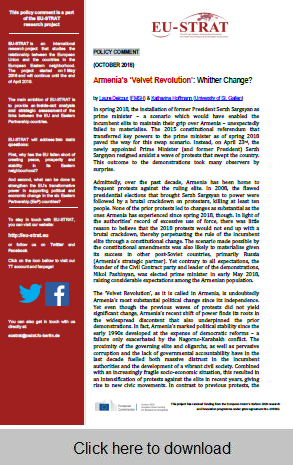Policy comment / October 2018
 Armenia’s ‘Velvet Revolution’: Whither Change?
Armenia’s ‘Velvet Revolution’: Whither Change?
by Laure Delcour (FMSH) & Katharina Hoffmann (University of St. Gallen)
“In spring 2018, the installation of former President Serzh Sargsyan as prime minister – a scenario which would have enabled the incumbent elite to maintain their grip over Armenia – unexpectedly failed to materialise. The 2015 constitutional referendum that transferred key powers to the prime minister as of spring 2018 paved the way for this swap scenario. Instead, on April 23rd, the newly appointed Prime Minister (and former President) Serzh Sargsyan resigned amidst a wave of protests that swept the country. This outcome to the demonstrations took many observers by surprise.
Admittedly, over the past decade, Armenia has been home to frequent protests against the ruling elite. In 2008, the flawed presidential elections that brought Serzh Sargsyan to power were followed by a brutal crackdown on protesters, killing at least ten people. None of the prior protests led to changes as substantial as the ones Armenia has experienced since spring 2018, though. In light of the authorities’ record of excessive use of force, there was little reason to believe that the 2018 protests would not end up with a brutal crackdown, thereby perpetuating the rule of the incumbent elite through a constitutional change. The scenario made possible by the constitutional amendments was also likely to materialise given its success in other post-Soviet countries, primarily Russia (Armenia’s strategic partner). Yet contrary to all expectations, the founder of the Civil Contract party and leader of the demonstrations, Nikol Pashinyan, was elected prime minister in early May 2018, raising considerable expectations among the Armenian population. ”
***
Policy comment / March 2018
 One country – two economic systems? The ‘partial reforms’ experiment in Belarus
One country – two economic systems? The ‘partial reforms’ experiment in Belarus
by Kamil Kłysiński (OSW)
“On December 22, 2017, Belarusian president Alexandr Lukashenka signed two important decrees: the first ‘On the Development of Entrepreneurship’ and the second ‘On the Development of the Digital Economy’. The degrees foresee an unprecedented opening of the private sector in Belarus, and give strong legal and tax incentives to the IT sector. They are the latest expression of a path that Belarus has taken over the past few years, in the course of which the IT sector has become a priority issue in economic policy.
At the same time, Belarus has firmly neglected recent calls by the International Monetary Fund (IMF) to restructure its state-owned sector. The Belarusian authorities have thus sent conflicting signals by building islands of a modern economy based on high-tech technologies, a developed service sector and private entrepreneurship, while still sustaining the old ineffective economic model of command-and-control.(…)”
***
Policy comment / August 2017
 Making Association with the EU a Modernizing Tool: towards a more focused, developmental and innovative approach
Making Association with the EU a Modernizing Tool: towards a more focused, developmental and innovative approach
by Klaudijus Maniokas (ESTEP), Kataryna Wolczuk (UoB), Laure Delcour (FMSH), Rilka Dragneva (UoB), Darius Žeruolis (ESTEP)
“The AA was meant to become a major tool not only to enhance relations with the EU, but also to help to modernize or even transform Eastern EU members in a similar manner to what was achieved during the latest EU enlargement to Central and Eastern Europe. Was this a feasible expectation? Does the AA have the potential to become a major modernization tool?
While the AAs offer a template for reforms in order to address weaknesses of the partner countries, such as weak state institutions, lack of competitiveness and socio-economic mis-development, importing the acquis by the partner countries is not only not the solution to these problems, but may actually exacerbate them. This is primarily because it is questionable whether these countries have the capacity to ensure the effectiveness of the vast and sophisticated corpus of rules they are importing, and, whether the acquis actually helps address the immediate developmental objectives of these countries. The suitability of the acquis for fast and cost-effective modernization of the state and economy is not clear. (…)”
***
Policy comment / January 2017
 Pro-Russian turn or preservation of
Pro-Russian turn or preservation of
“oligarchic” status quo? Moldova after the
presidential elections
by Kamil Całus (OSW)
“On the 13th of November, the second round of Moldova’s first direct presidential elections since 1996 took place. Igor Dodon, the leader of the pro-Russian Party of Socialists of the Republic of Moldova (PSRM), was announced the winner with 52.11 per cent of the vote. (…) Instead of Dodon’s seemingly pro-Russian agenda, it is this oligarchic consolidation that is likely to represent the greatest threat for Moldova’s European integration and may become a major impediment for the implementation of the Association Agreement (AA) with the European Union (EU). (…)”
This policy comment was a part of the EU-STRAT Newsletter series (Issue 02/2017)
***
Policy comment / July 2016
 After the Dutch ‘No’: Prospects for the EU-Ukraine Association Agreement
After the Dutch ‘No’: Prospects for the EU-Ukraine Association Agreement
by Rafał Sadowski (OSW)
“On July 1, 2016, the Association Agreements (AA) between the European Union (EU) and Georgia and between the EU and Moldova fully entered into force. Even though Ukraine had also signed and finished all procedures to implement the AA, the EU-Ukrainian agreement did not enter into force at the same time. While 27 EU Member States had ratified the agreement, the Dutch government was forced to suspend its ratification as the result of a referendum on this question in the Netherlands on April 6, 2016. In contrast to the ‘Brexit’ referendum in the United Kingdom, this referendum was not a government initiative, but was held as the first application of a referendum law that made a public consultation obligatory after the collection of 300 thousand signatures over a period of six weeks. (…)”
This policy comment was a part of the EU-STRAT Newsletter series (Issue 01/2016)
